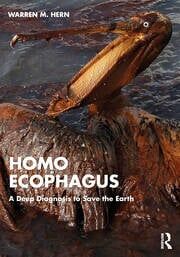Environment
Homo Ecophagus: A Species Who Devours Global Ecosystems
A new book shows how we have vanquished earth and how we can do much better.
Posted November 20, 2022 Reviewed by Kaja Perina
Key points
- Physician and researcher Warren Hern argues that humans have evolved cultures and adaptations that have now become malignant.
- More than simply offering "a list of horribles," he offers hope by suggesting practical remedies for changing our maladaptive ways.

Many authors, ranging from academics, to other professionals, to nature lovers of all ages, are deeply concerned that we are on a rapid and unstoppable downward spiral and heading toward the decimation or demise of vital environs and their nonhuman residents and their homes.
Many of these people are not merely "downers" about what is happening but also offer hope for better futures for all animals, nonhuman and human, and flora, all of which are being globally harmed.1

I recently read Dr. Warren Hern's fascinating book Homo Ecophagus: A Deep Diagnosis to Save the Earth and was taken in by accolades from diverse and renowned researchers and his unique physician's view—basically doing a differential diagnosis—of what we are doing to our planet and how we can change our ways from the point of view of a practicing physician.2
I'm thrilled Warren could answer a few questions.
Marc Bekoff: Why did you write Homo Ecophagus?
Warren Hern: The book gives me a broad canvas to show how all the elements of our current global ecological crisis are related.
MB: How does your book relate to your background and general areas of interest?
WH: I have been insatiably curious about my environment and other living things since my youngest years. I have spent a lot of my life outdoors in natural settings. As a photographer, I developed a passion for wildlife and natural history photography. It’s an intensive way to see the beauty and wonder of nature.
Second, I am trained as a physician and as an epidemiologist to look for patterns in health and illness. This helped me see and understand the malignant characteristics of human society and its activities. It helped me to see the consequences of this for wild places that I profoundly love and which were destroyed by human activities.
Third, I have studied anthropology and cultural ecology, so I focus on how human societies interact with and affect their environments. That is really what this book is about. It also includes a lot of personal observations and comments on public policy questions.
Ultimately, our survival—and the survival of countless other species—depends on the public policies that we make as a species. Right now, our policy as a species is to destroy our own environment and life support system as quickly as possible.
MB: Who is your intended audience?
WH: My principal intended audience is the educated public and especially leaders who want to understand the unending and increasingly disruptive ecological catastrophes that we are experiencing and why they are happening. I want educated adult citizens to understand how they are related and what this means for public policies.
My second intended audience is young people who are learning about the world. I think my book would be timely and excellent reading for high school students and university undergraduates who have a lot of questions about why we are facing life-threatening climate change, catastrophic weather events such as hurricanes and severe drought, crop shortages, famine, and epidemic disease. Why are we at 8 billion people and counting?
MB: What are some of the topics you weave into your book and what are some of your major messages?
WH: This book is really the fulfillment of over 50 years of studying this idea and these relationships that have become an existential threat to the survival of the human species but more than that, to our functioning biosphere and millions of other species with whom we share the planet Earth. Writing the book required me to see and explain all the facets of this in ways that other people can see and understand what I am saying. I also learned a lot, and much of it was alarming. It’s worse than I thought.
Essentially, this book presents a new view and concept of the human species per se and within the context of the global biosphere in which we live. We are not separate from the ecosystem. We are part of it, and we are destroying it as rapidly as possible. This means extinction for us and uncounted other species.
The human species now has all the major characteristics of a malignant process. We have become a new species, a superorganism, Homo ecophagus (“the man who devours the ecosystem”), that is in the process of converting all plant, animal, organic, and inorganic material on the planet to human biomass or its adaptive adjuncts and support systems. We are devouring the planet. We are destroying our home, the Earth. This is the definition of maladaptive.
It is critical to our survival not to mention the survival of all other species that we understand this dilemma that we have created and act now to stop this malignant process.
MB: How does your book differ from others that are concerned with some of the same general topics?
WH: There are many excellent books that give the list of horrible problems and the details of how they are happening, and there are many excellent books that give recommendations about what to do about these problems. My book goes to the origins of the problem, which is that the human species has transformed itself via human culture into a malignant process with many of the classical manifestations of malignancy.nnThis is the only hypothesis or theory that explains how all these factors are related.
More than a list of horribles, my book gives a diagnosis, a prognosis, and points the way to saving both ourselves and the Earth from the consequences of these.
MB: Are you hopeful that as people learn more about how we can truly and deeply connect with wild animals they will come to treat animals and all of nature with more respect and dignity?
WH: Yes. There is nothing like being in a completely wild setting in a place undisturbed by human beings such as the Amazon rain forest, for example, to see, experience and admire the profound complexity and beauty of nature. Observing and understanding animals makes us acutely conscious of our shared experience and survival. We must value their survival as much as our own for moral reasons, but also because our own survival depends on this. We must stop our terrifying destruction of other species and the ecosystems in which we and they must survive before it is too late.
References
In conversation with Dr. Warren Herns. a practicing physician in Boulder, Colorado, where he is also on the anthropology faculty at the University of Colorado.
1) See for example: Anthropocene Psychology: Dogs as Mirrors of Human Behavior; How Birds and Nature Rewild Our Hearts and Souls; Deer Man: Seven Years of Living in the Wild; Wildlife Conservation: Bringing Compassion to Wild Animals; and Why It's Essential to Listen to the Hidden Sounds of Nature.
2) "Homo Ecophagus is a fascinating analysis by the physician scientist who pioneered the idea that humanity is performing like a metastatic skin cancer on our planet. Read it and act!" —Paul and Anne Ehrlich, authors of The Population Bomb; "Warren Hern develops a deep and unsettling comparison between metastatic cancer and the expanding footprint of humanity, as we consume and degrade the environment that sustains us...The book is a must read for all of us who are concerned about the environment and our collective future." —John W. Terborgh, The James B. Duke Professor of Environmental Science and Co-Director of the Center for Tropical Conservation, Duke University
The Future of Animal Sentience: Colorado can Lead the Way.
Byrne, Peter. The befouling of Point Reyes National Seashore. Bohemian, November 16, 2022.
Evans, Clay Bonnyman. Doctor’s diagnosis for the Earth: a terminal human malignancy. Colorado Arts and Sciences Magazine, November 8, 2022.




